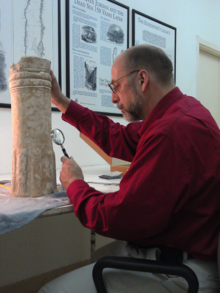A renowned classics scholar who recently made headlines for his high-profile firing from a top Christian college will arrive at GW next fall with a new major already in the works.

Christopher Rollston is planning a degree in Near Eastern studies, which will allow students to study ancient civilizations using modern tools of analysis like visualization and languages.
Rollston was brought on as a visiting professor at GW in spring 2013, several months after he was fired from the Emmanuel Christian Seminary in Tennessee. He had clashed with the seminary leadership over his controversial column in the Huffington Post calling out female discrimination in the Bible.
The seminary, with just 124 students and eight full-time professors, bought out Rollston’s contract after the president argued that he would offend students and turn off donors.
“Gender equality may not have been the norm two or three millennia ago, but it is essential. So, the next time someone refers to ‘biblical values,’ it’s worth mentioning to them that the Bible often marginalized women and that’s not something anyone should value,” Rollston wrote in September 2012.
More than a year later, Rollston, who is researching at the Tel Aviv University this semester, wrote in an email that the issue remains important to him.
“Gender equality is part of the fabric of my being. And the subject is personal, as my wife and I have three daughters,” Rollston said.
As a member of GW’s faculty, Rollston will lead planning for the classics departments’ third major, in addition to Arabic and Classics, which includes studying one or two ancient languages.
GW added a major and minor in Arabic in 2012. Prior to that, students had been able to declare a minor in Hebrew and Arabic.
The classics department had been looking to add a Near Eastern studies major, Eric Cline, chair of the classics department, said. But Cline said he urged GW to hire Rollston, an acquaintance of about 20 years, to help speed up the process.
“We weren’t even able to consider doing it without the addition of someone like Dr. Rollston,” Cline added.
The new major will bring GW in line with departments at John’s Hopkins and Princeton universities.
Rollston will provide the department with the necessary expertise in near eastern languages and religions to round out course offering for the new major in the subject, Cline said.
“In addition to his languages, his breadth of knowledge stretches from the religions of the ancient Near East to early Christianity and its interactions with Greece and Rome. He not only can teach Akkadian and Ugaritic, if anyone ever wants to takes those languages, but he can also teach New Testament Greek and Biblical Hebrew,” Cline said.
Rollston will begin by offering courses consistent with a possible curriculum for the new major.
“We are interested in offering the courses that students have the greatest interest in, so I am very much looking forward to getting on the ground at GWU and to hearing from students,” Rollston said.







